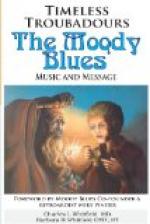It is not to be supposed that the troubadours turned to religious poetry simply because the Albigeois crusade had raised the religious question. Purely devotional poetry is found at an earlier period.[29] It appears at first only sporadically, and some of the greatest troubadours have left no religious poems that have reached us. The fact is, that the nature of troubadour poetry and its homage to the married woman were incompatible with the highest standard of religious devotion. The famous alba of Guiraut de Bornelh invokes the “glorious king, true light and splendour, Lord Almighty,” for the purpose of praying that the lovers [90] for whom the speaker is keeping watch may be undisturbed in interchange of their affections. Prayer for the success of attempted adultery is a contradiction in terms. For a theory of religion which could regard the Deity as a possible accomplice in crime, the Church of Southern France in the twelfth century is to blame: we cannot expect that the troubadours in general should be more religious than the professional exponents of religion. On the other hand, poems of real devotional feeling are found, even from the earliest times: the sensual Count of Poitiers, the first troubadour known to us, concludes his career with a poem of resignation bidding farewell to the world, “leaving all that I love, the brilliant life of chivalry, but since it pleases God, I resign myself and pray Him to keep me among His own.” Many troubadours, as has been said, ended their lives in monasteries and the disappointments or griefs which drove them to this course often aroused religious feelings, regrets for past follies and resolutions of repentance, which found expression in poetry. Peire d’Auvergne wrote several religious hymns after his retirement from the world; these are largely composed of reiterated articles of the Christian faith in metrical form and are as unpoetical as they are orthodox, Crusade poems and planhs upon the [91] deaths of famous nobles or patrons are religious only in a secondary sense. A fine religious alba is ascribed to Folquet of Marseilles—
Vers Dieus, e.l vostre nom
e de sancta Maria
m’esvelherai hueimais,
pus l’estela del dia
ven daus Jerusalem que’
m’ensenha qu’ien dia:
estatz
sus e levatz,
senhor,
que Dieu amatz!
que.l
jorns es aprosmatz
e
la nuech ten sa via;
e




